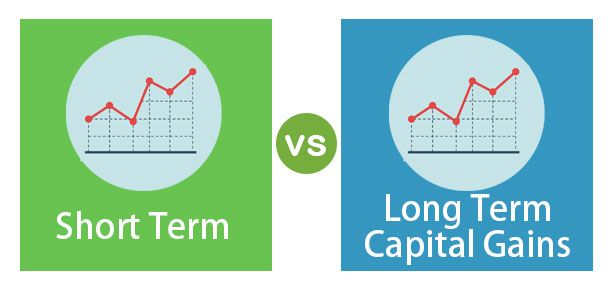Table Of Contents
Short Term and Long Term Capital Gains Differences
Short-term capital gain refers to the profit earned by selling of assets like shares/securities or others capital assets which were held for a period less than one year whereas long-term capital gain refers to the gain by selling of assets or securities that were held for a period of more than one year
When you sell an asset and you receive a consideration that’s more than what you paid for it, you need to pay taxes for the increase in the value of the asset. This increase in value is called a capital gain. For example, let’s say that you own a stock and you sell it off after keeping it for six months. While selling it, you have got a consideration that’s more than what you paid for the stock. The increase in value will be called capital gains.
In capital gains, there are two elements. The first element is the cost basis. And the second element is the duration of the assets held.
- Cost basis is the amount you paid for owning an asset. For example, if you have purchased a stock at $100 and you sell it off at $150, the cost basis is $100. And the capital gain from the stock would be = ($150 – $100) = $50.
- On the basis of the duration of financial and capital assets held, we decide whether it’s a short or a long-term asset. And on the basis of that, we receive either one of them.

Short Term vs Long Term Capital Gains Infographics
Let’s see the top difference between short vs long term capital gains.

Key Differences
- Short-term capital gain can be earned on short-term assets and long-term capital gain can be earned on long-term assets.
- In the case of financial assets, the short-term capital gain can be earned when the asset is held for less than a year. For later, the financial asset has to be held for more than a year.
- If a capital asset is held for less than 24 months (for immovable asset) and 36 months (for movable asset), we will have STCG and if a capital asset is held for more than 24 months (for immovable asset) and 36 months (for movable asset), we will receive long-term capital gain by selling it off.
- STCG can be calculated by taking the full value of consideration and then deducting the expenses required to transfer the asset, cost of acquisition, cost of the improvement, and an exemption (if any). Long-term capital gain, on the other hand, can be computed by taking the full value of consideration and then deducting the expenses required to transfer the asset, indexed cost of acquisition, indexed cost of the improvement, and an exemption (if any). The indexed cost of acquisition and indexed cost of the improvement is calculated by taking the ratio of the inflation of the year of acquiring and the inflation of the year of transferring the asset.
- For STCG, one needs to pay a normal tax rate. For long-term capital gain, one needs to pay 20% of tax.
Short Term vs Long Term Capital Gains Video Explanation
Short Term vs Long Term Capital Gains Comparative Table
| Basis for Comparison | Short-term Capital Gain | Long-term Capital Gain |
|---|---|---|
| 1. Related To | Short-term assets | Long-term assets |
| 2. Meaning | When an individual/company earns more than what is paid by selling the short-term asset, the difference between the consideration received and the cost basis is called an STCG. | When an individual/company earns more than what is paid by selling the long-term asset, the difference between the consideration received and the cost basis is called an LTCG. |
| 3. Financial Asset | We will label the capital gain as a short-term one when the duration of a financial asset held is less than a year. | We will label the capital gain as a long-term one when the duration of a financial asset held is more than a year. |
| 4. Capital Asset | We will call short-term assets as a capital asset when the assets are owned for less than 24 months in the case of immovable property and less than 36 months in the case of movable property. | We will call short-term assets as a capital asset when the assets are owned for more than 24 months in the case of immovable property and more than 36 months in the case of movable property. |
| 5. Tax Rate | The normal tax rate is applicable. | 20% (subject to change as per the applicability of tax rate). |
Conclusion
The most important thing about capital gain is to understand the difference in duration for which the assets are held because the duration makes all the difference. Plus for calculating the long-term capital gain, inflation also needs to be taken into account. If it’s possible, it’s advised that the owner of the asset should hold onto the asset for as long as she can to avail of long-term capital gain.
